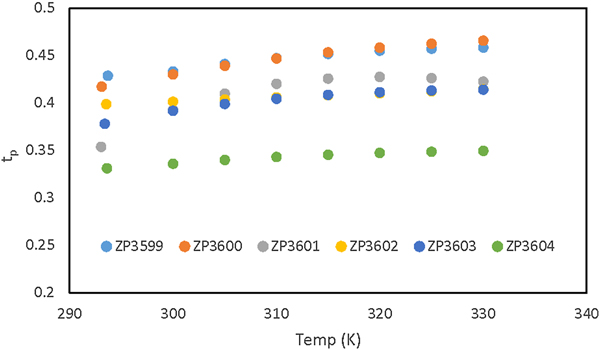No CrossRef data available.
Published online by Cambridge University Press: 30 September 2019

The authors report on 7Li, 19F, and 1H pulsed field gradient NMR measurements of 26 organosilyl nitrile solvent-based electrolytes of either lithium bis(trifluorosulfonyl)imide (LiTFSI) or lithium hexafluorophosphate. Lithium transport numbers (as high as 0.50) were measured and are highest in the LiTFSI electrolytes. The authors also report on solvent blend electrolytes of fluoroorganosilyl (FOS) nitrile solvent mixed with ethylene carbonate (EC) and diethyl carbonate. Solvent diffusion measurements on an electrolyte with 6% FOS suggest both the FOS and EC solvate the lithium cation. By comparing lithium transport and transference numbers, the authors find less ion pairing in FOS nitrile carbonate blend electrolytes and difluoroorganosilyl nitrile electrolytes.
To send this article to your Kindle, first ensure no-reply@cambridge.org is added to your Approved Personal Document E-mail List under your Personal Document Settings on the Manage Your Content and Devices page of your Amazon account. Then enter the ‘name’ part of your Kindle email address below. Find out more about sending to your Kindle. Find out more about saving to your Kindle.
Note you can select to save to either the @free.kindle.com or @kindle.com variations. ‘@free.kindle.com’ emails are free but can only be saved to your device when it is connected to wi-fi. ‘@kindle.com’ emails can be delivered even when you are not connected to wi-fi, but note that service fees apply.
Find out more about the Kindle Personal Document Service.
To save this article to your Dropbox account, please select one or more formats and confirm that you agree to abide by our usage policies. If this is the first time you used this feature, you will be asked to authorise Cambridge Core to connect with your Dropbox account. Find out more about saving content to Dropbox.
To save this article to your Google Drive account, please select one or more formats and confirm that you agree to abide by our usage policies. If this is the first time you used this feature, you will be asked to authorise Cambridge Core to connect with your Google Drive account. Find out more about saving content to Google Drive.